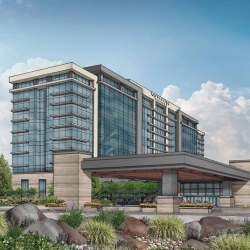The city of Elk Grove is the latest battleground over gambling in the state of California. Like many previous political showdowns over gambling in the state, this one pits tribal gaming interests against private interests.
The Wilton Rancheria Indian tribe seeks to build a $400 million casino-hotel off Highway 99 in Elk Grove. Knighted Ventures LLC, which has ties to two Sacramento card rooms, is behind a voter referndum to end the project before it starts.
Elk Grove’s Shopping Mall
The residents of Elk Grove are concerned, because the referendum could destroy their chances of receiving a brand new shopping mall. The city has been trying to build a shopping mall since the city incorporated in 2000.
Raymond Hitchcock: “A Far Greater Cause”
Raymond Hitchcock, the tribal chairman for the Wilton Rancheria Indians, said that the project is a similar opportunity for his tribe. Hitchcock said the would-be resort “is an opportunity for our tribe to provide self-governance, self-sufficiency, self-determination, job opportunities, to provide housing and medical benefits.”
Pitting his tribe as the David in a David-vs-Goliath confrontation, Raymond Hitchcock said, “I think that’s a far greater cause. They’re out for themselves.”
The owners of the card rooms tell an entirely different story. In their version of the dispute, they are the underdogs in a California gambling industry which increasingly is dominated by the tribal casinos. Knighted Ventures and its associates are old, venerable businesses in the area. They are small operations, seeking to hold onto a traditional Mom-and-Pop business as a massive new gaming operator tries to enter the area.
Kyle Kirkland on Legal Measures
Kyle Kirkland, President of the California Gaming Association — and a Fresno poker room owner himself — says that his group represents legitimate business owners who want to protect themselves. Kirkland told the Sacramento Bee, “Certainly it’s a big project and it will have a big impact. It’s sort of irresponsible if you don’t use whatever tools you have to try to challenge it.”
The card room owners would argue that the tribal casinos of California are every bit as much of a commercial enterprise as their card rooms. What’s more, the card rooms are small commercial interests compared to the tribal casinos.
The 72 card rooms in California — some of which have been in operation since the 1930s — generate about $800 million in revenue each year. The Las Vegas-style tribal casinos, which only appeared after Proposition I was passed in 2000, generate over $7 billion in revenue.
Tribal Lobbying Has Its Effect
Despite the Wilton Rancheria Indian’s portrayal of the Elk Grove Project as a greater cause, those already-operating tribal casinos have tremendous influence on California’s gaming industry. Since 2013, the Pechanga and Agua Caliente tribes have stopped online poker legislation from being passed in the California State Legislature. Lawmakers will say that no gaming legislation passes through the California houses without approval from the majority of tribes.
A big part of the trouble has been the Agua Caliente and Pechanga tribes’ resistance to PokerStars’ inclusion in the California poker industry. The tribes want PokerStars deemed a “bad actor” and barred from the California market, at least for the first 10 years of operation. A handful of tribes and some Los Angeles card rooms with a PokerStars contract side with the world’s number one poker site, which controls 70% of the global poker traffic.
Restrictions on Slot Machines and Banked Games
When it comes to the small brick-and-mortar California poker rooms, the tribes have most of the power. They have laws in place which assure they have a monopoly over slot machine gambling, which generates up to 70% of the revenue for land-based casinos. Tribal casinos also have a monopoly on “banked games” — that is, games in which the casino bets against players. Blackjack, roulette, and baccarat are among the most popular banked games.
That leaves the card rooms with player-versus-player games like poker. Even then, the tribes continue to lobby the California legislature to have restrictions placed on the card rules. For instance, they currently are pushing a bill that would require a 2-minute break every hour at poker tables, a bill which is seen largely as an attempt to hurt the revenues at the remaining card rooms.
The Limelight Card Room
John Mikacich of the Limelight Card Room in Sacramento described the private poker clubs as existing barely on the edge. The Limelight Card Room is the smallest card room in California, and has been a fixture since the 1970s.
The Limelight exists as a kind of neighborhood bar which attracts old-timers who like the personal touch. John Mikacich says of the many laws passed against card rooms, “It’s difficult when you’re at a significant disadvantage.”
Elk Grove in the Middle
The story of Elk Grove shows that everyone has their perspective, and everyone has their interests. The leaders of Elk Grove have sought a shopping mall for 17 years, so they made a deal with the Wilton Rancheria Indian tribe. The Wilton Rancheria Indians want to provide for their families and their future, so they want a casino like the other tribes in California. The local poker rooms want to protect their own families and future, so they seek local ordinances to stop the Wilton Rancheria’s encroachment.
All see themselves as the “little guys” fighting entrenched interests. Perhaps all of them are right and the various moral and ethnical arguments are a false debate.

